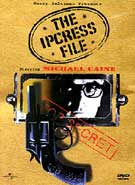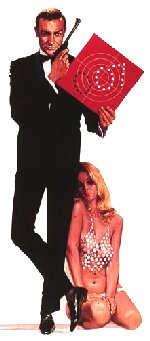| Release List | Reviews | Price Search | Shop | Newsletter | Forum | DVD Giveaways | Blu-Ray/ HD DVD | Advertise |
| Reviews & Columns |
|
Reviews DVD TV on DVD Blu-ray International DVDs Theatrical Reviews by Studio Video Games Features Collector Series DVDs Easter Egg Database Interviews DVD Talk TV DVD Talk Radio Feature Articles Columns Anime Talk DVD Savant HD Talk Horror DVDs Silent DVD
|
DVD Talk Forum |
|
|
| Resources |
|
DVD Price Search Customer Service #'s RCE Info Links |
|
Columns
|
 |
The Ipcress File
|
||||
( A Letter Response from an English reader, Ian Dobson, has been added at the bottom of this review, 2/18/00) In all the hubbub last fall following the release of the first boxed set of James Bond special editions, an equally important Anchor Bay release seems to have gotten lost in the shuffle. The Ipcress File was a modest success in 1965 and has endured among aficionados as perhaps the best non-007 spy film of the 60s. And Anchor Bay's new DVD is a wonderful way to be introduced to Len Deighton's 'Thinking Man's James Bond.' As the 'Bondwagon' was just getting up speed, Bond producer Harry Saltzman initiated another spy series apart from his partner Albert R. Broccoli. Len Deighton's cockney agent Harry Palmer, played by Michael Caine in only his second starring role, is the antithesis of 007. He wears glasses, prefers to cook for himself at home and operates in a naturalistic spy environment of dingy offices, overbearing Army intelligence superiors and drab assignments. His personal dreams go no farther than being able to afford his own car. Basically a petty crook, Harry became a spy to avoid court-martial, a background that his employers think perfectly suits him for espionage work. There are three 60s Harry Palmer films: this one, Funeral in Berlin and Billion Dollar Brain; and latecomer 1995's Bullet to Beijing. 1
Unlike Derek Flint, Matt Helm, et. al, The Ipcress File is not a spoof. Smugly insolent and emotionally insulated, Harry is a spy as working-stiff, a boy who wants to get ahead but is constantly reminded of his worthlessness by the stifling bureaucracy within which he must labor. Perhaps the spelling should be 'labour' ... unlike the deliberately Americanized Bond world, Harry Palmer's millieu is resolutely English, from the tastes of his bosses (a marching band murdering Mozart, tea breaks in top secret meetings) to its disdain for American supermarkets and pipe-smoking, poaching American operatives. Palmer doesn't have gadgets or convenient heating vents in prison cells to help him out of his tough scrapes, but when the rough stuff is dished out Harry can take it. He proves himself not a cockney braggart but a better man than the upscale 'passed-over majors' who order him about. We become totally immersed in Harry's deglamorized, re-glamorized world in a way not afforded by the fantastic, sometimes cartoonish 007 adventures. The Ipcress File became critically famous when Billy Wilder lambasted young Canadian director Sidney J. Furie's camera style, saying Furie couldn't shoot a scene without framing it through a fireplace or the back of a refrigerator. Wilder was coarse but accurate. There are no fireplaces on view but Furie's camera compositions are some of the most extreme ever seen. He's taken the early CinemaScope discovery by Elia Kazan that natural masking compositions can be used to 'iris in' on selected parts of a frame without enlarging them in close up, to its logical end. When the shots aren't extremely high-angled, low angled or tilted, they're framed through every kind of foreground obstruction imaginable: lamps, doors, telephones. Often 75% of the frame is blotted out, forcing us to look over a shoulder or under an armpit to view a character. What makes Wilder's complaint irrelevant is that the style works, and works very well. After 35 years of increasingly pointless visual elaboration in movies, cameraman Otto Heller's (Peeping Tom) work in The Ipcress File looks relatively restrained, and certainly fits the subject material: the shots focus attention instead of being merely decorative (Watch a Michael Winner opus sometime). Furie's screen often resembles a puzzle with pieces removed, exactly the situation Harry Palmer is facing. Together with John Barry's terrific, jazzy score (reminiscent of Thunderball, but far more hip), The Ipcress File seems like an update on The Third Man, substituting 'cool' pre-Mod London for a ruined Vienna. Some innovations need pointing out to be appreciated. The exchange of prisoner and payoff in an underground parking lot, with machine gun retainers moving in ritualized symmetrical patterns, has been imitated a hundred times since. Furie downplays some elements such as a stairway fight behind the Albert Hall seen completely in distancing telephoto, through the obscuring panes of a phone booth. Another murder at a traffic intersection seems an homage to Fritz Lang's Mabuse Films. Lang had reused a perfect killing from The Testament of Dr. Mabuse in his 1960 1,000 Eyes of Dr. Mabuse. Here Furie restages Lang's situation once again, adding his own mark of cool understatement. A visually-oriented sequence near the conclusion (no details here for those of you who hate spoilers) that makes Savant seriously wonder if Douglas Trumbull saw it while working on 2001: A Space Odyssey. The zooming, blurring, streaking visual assault looks as if it might have inspired the technically minded Trumbull to go three steps further and create his Slit-Scan Stargate trick process. Even the situations in the two films, alternating close-ups of an anguished character with the mind-bending visuals, are similar ... Anchor Bay's The Ipcress File is one great DVD. Enhanced for 16:9, the Techniscope image is clear and almost spotless, as can be seen when bright lights or red lampshades blot out much of the frame. The slight grain of the image was always there, Techniscope being a half-frame camera format blown up and squeezed to normal 'scope in post production. Original Techniscope films were printed in Technicolor, whose clarity brought the quality back up to par. The audio is a robust mono. John Barry's wonderful music (one of the first LPs bought by young Savant) comes across in all its glory; there's not an inaudible line of dialogue in the whole accent-heavy show. Ample production notes background the talent on view. A nice still section is set to music and edited as a little show unto itself. But even better is the feature length scene-specific running commentary from director Sidney J. Furie and editor (later director) Peter Hunt. Excellent conversationalists, they share a hearty laugh when surprised by elements they'd forgotten, such as the reveal of the meaning of the word Ipcress. Their unhurried, agenda-less discussion brings out a number of fascinating facts, the kind that don't find their way into print: Production designer Ken Adam didn't create any cavernous sets 2 but managed to put his imprint on some existing rooms by emptying them of furniture; Hunt says he brought John Barry into the world of James Bond on Dr. No when director Terence Young threw out the first score, which he called 'mining disaster music.' Producer Harry Saltzman hated Furie and his oddball style and went so far as to bar him from the editing room. According to Furie, Saltzman also excluded him from the film's party at Cannes and even stole his best picture British Academy Award! Peter Hunt tries but doesn't quite get Furie to fess up to having had an affair with gorgeous Ipcress star Sue Lloyd. Ready for a REAL spy film with a jazzy style, one that doesn't self-destruct into an Austin Powers joke? Willing to put up with a story that builds characters and situations and treats you like you have a brain? Then The Ipcress File with the marvelous Michael Caine, is for you. Anchor Bay's knockout DVD is perfect for James Bond fans looking for an alternative and for everyone seeking a class act in espionage.
On a scale of Excellent, Good, Fair, and Poor,
The Ipcress File rates:
Footnotes:
1. All three of the 60s features are superior. Billion Dollar Brain has a bad reputation but is actually quite stylish under the direction of a pre-wacko Ken Russell. MGM has a terrific 'scope video master of this last film, in which Caine costars with Karl Malden, Ed Begley and the gorgeous, ill-fated Francoise Dorleac of Young Girls of Rochefort and Cul-de-Sac. Savant has been told the reason it hasn't been released to video is because 'licensing rights' to some unstated content are too expensive. Watching the film, part of a Beatles song is heard and an album cover is shown, leading Savant to guess they might be the reason why.
2. Well, there is one 'cavernous' set but it is atypical of what became Adam's forte: the war room of Doctor Strangelove, Goldfinger's playroom, the sub pen in The Spy Who Loved Me. 3. A Letter Response from English reader Ian Dobson, who responded to Savant's question, "How do viewers relate to The Ipcress File in its country of origin?" Mr. Dobson was kind enough to submit the following: "(It) is a great film because it has its own style and the review communicates this very well. Unfortunately the TV pan & scan is the only way most people have seen it for over thirty years. The naturalistic acting style was unusual for an English colour widescreen movie then.
The challege was The first English supermarkets were not large. The novelty was the range of stock and 'self service'. In the film you can see Ross is bemused by it all. The use of London Landmarks the Albert Hall, Trafalgar Square and the London Library to suggest understated traditional power is brilliant. If you live and work in London (which I do) you take them for granted and ignore them, so the film does too. Each of the characters is well drawn so the story works for the international audience. The reason I love the movie is all the actors you see onscreen have played the same stereotypes for years in British films but here they get to play them naturalistically. The film also captures the changes in the British caste / class system at the time. Women and the talented working class on the way up. Everyone else on the way down. The film is now a wonderful memoir for anyone who remembers London of this period. So little traffic on the roads, so many parking spaces! Old Pounds, Shillings & Pence! Telephone operators! British Rail! No hordes of tourists/refugees from all over the world with identical American-style outfits, sneakers & mobile phones. A time when London was unmistakably English and not identical to every other city on the planet with world wide chain-stores selling identical goods. No MacDonalds, Burger King, Pizza Hut, Gap, Levis, Borders or Starbucks.
Your review communicates these ideas very well."
Review Staff | About DVD Talk | Newsletter Subscribe | Join DVD Talk Forum |
|
| Release List | Reviews | Price Search | Shop | SUBSCRIBE | Forum | DVD Giveaways | Blu-Ray/ HD DVD | Advertise |







